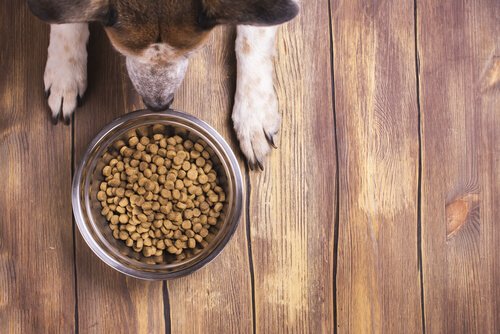Why Are There Grain Free Dog Foods?

Gluten intolerance has become increasingly common in recent years. Of course, many people actually have, but there are other people who have become obsessed with the idea. They may even go so far that they believe their pets are gluten intolerant. There are even grain-free dog foods for gluten intolerant dogs. However, are they actually necessary for all dogs?
Why are there grain-free dog foods?
There was a logical reason why companies began making this kind of dog food. “If dogs are related to wolves, and wolves can’t eat grains, why should dogs?” This definitely sounds reasonable, but it brings up some questions.
It’s common knowledge that dogs descend from wolves. However, they have evolved a lot, especially when they were domesticated and lived with humans. This has caused their bodies to undergo changes, such as their digestive process.
There are dogs that do suffer from a gluten intolerance, and that’s another reason why grain-free dog foods exist. However, not all dogs should avoid eating grains. Studies have shown that the evolution that’s mentioned above allows dogs to absorb carbohydrates that are found in grains.
In fact, ever since they began living with humans, dogs have been eating grains in dog food and in BARF diets.

Grain-free dog food, yes or no?
Some believe that carbohydrates cause obesity in dogs. Therefore, many owners choose grain-free dog food to control their pet’s weight.
However, just because dog food doesn’t have any grains, it doesn’t mean that they’re free of carbohydrates. Carbohydrates are an important ingredient in the preparation of dog food and they help to give them their shape. It’s like trying to make a sponge cake without any flour. You just work out.
What’s even worse is that the carbohydrates in grains are complex. This means that they’re natural and are easy to absorb and digest. A dog with a balanced diet that does regular physical activity can maintain their weight and be healthy without any problems.
However, other carbohydrates used in grain-free dog food can be artificial and difficult to digest. These can then turn into fat and give you the opposite result that you were hoping for.
These may come from potatoes, sweet potatoes or legumes like chickpeas or lentils. If your dog doesn’t have a gluten intolerance, but you think they should stay away from it, keep in mind that wolves didn’t eat any of these foods either. If your goal is to feed them like his ancestors, using these types of dog food won’t help.

Obviously, if your dog has a problem with gluten, try feeding them this type of food if you don’t want to use the BARF diet. The best thing to do is talk to your vet and have him/her tell you what would be best for your dog.
Are there dogs with allergies?
Currently, it’s believed that only setters can have gluten intolerance. It is the only breed known to have cases of it. As for other allergies, it’s estimated that only 10% are food-related. Among them, grains are an almost imperceptible minority.
Therefore, if your dog doesn’t have a diagnosed gluten problem, there’s no reason to feed them grain-free dog foods. This could ruin your goal of providing them with a healthy and balanced diet.
Even if you opt for grain-free dog food, you should buy the good quality ones. Although they’re more expensive, they’ve thoroughly gone through control measures. Remember that the BARF diet is always an excellent alternative to a healthy diet.
Gluten intolerance has become increasingly common in recent years. Of course, many people actually have, but there are other people who have become obsessed with the idea. They may even go so far that they believe their pets are gluten intolerant. There are even grain-free dog foods for gluten intolerant dogs. However, are they actually necessary for all dogs?
Why are there grain-free dog foods?
There was a logical reason why companies began making this kind of dog food. “If dogs are related to wolves, and wolves can’t eat grains, why should dogs?” This definitely sounds reasonable, but it brings up some questions.
It’s common knowledge that dogs descend from wolves. However, they have evolved a lot, especially when they were domesticated and lived with humans. This has caused their bodies to undergo changes, such as their digestive process.
There are dogs that do suffer from a gluten intolerance, and that’s another reason why grain-free dog foods exist. However, not all dogs should avoid eating grains. Studies have shown that the evolution that’s mentioned above allows dogs to absorb carbohydrates that are found in grains.
In fact, ever since they began living with humans, dogs have been eating grains in dog food and in BARF diets.

Grain-free dog food, yes or no?
Some believe that carbohydrates cause obesity in dogs. Therefore, many owners choose grain-free dog food to control their pet’s weight.
However, just because dog food doesn’t have any grains, it doesn’t mean that they’re free of carbohydrates. Carbohydrates are an important ingredient in the preparation of dog food and they help to give them their shape. It’s like trying to make a sponge cake without any flour. You just work out.
What’s even worse is that the carbohydrates in grains are complex. This means that they’re natural and are easy to absorb and digest. A dog with a balanced diet that does regular physical activity can maintain their weight and be healthy without any problems.
However, other carbohydrates used in grain-free dog food can be artificial and difficult to digest. These can then turn into fat and give you the opposite result that you were hoping for.
These may come from potatoes, sweet potatoes or legumes like chickpeas or lentils. If your dog doesn’t have a gluten intolerance, but you think they should stay away from it, keep in mind that wolves didn’t eat any of these foods either. If your goal is to feed them like his ancestors, using these types of dog food won’t help.

Obviously, if your dog has a problem with gluten, try feeding them this type of food if you don’t want to use the BARF diet. The best thing to do is talk to your vet and have him/her tell you what would be best for your dog.
Are there dogs with allergies?
Currently, it’s believed that only setters can have gluten intolerance. It is the only breed known to have cases of it. As for other allergies, it’s estimated that only 10% are food-related. Among them, grains are an almost imperceptible minority.
Therefore, if your dog doesn’t have a diagnosed gluten problem, there’s no reason to feed them grain-free dog foods. This could ruin your goal of providing them with a healthy and balanced diet.
Even if you opt for grain-free dog food, you should buy the good quality ones. Although they’re more expensive, they’ve thoroughly gone through control measures. Remember that the BARF diet is always an excellent alternative to a healthy diet.
This text is provided for informational purposes only and does not replace consultation with a professional. If in doubt, consult your specialist.








